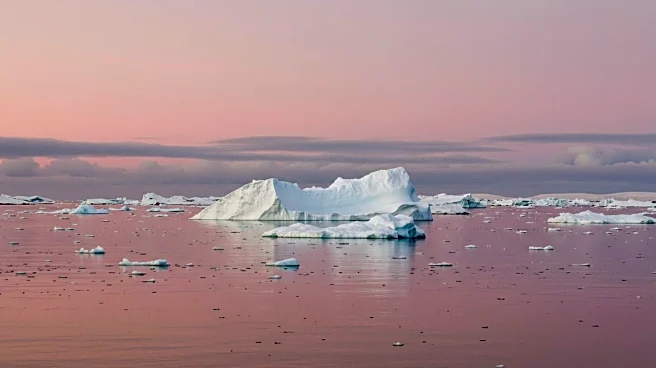What's Happening?
Recent scientific studies have revealed a dramatic slowdown in the melting of Arctic sea ice over the past 20 years. Despite rising carbon emissions, there has been no statistically significant decline in sea ice extent since 2005. Researchers attribute this slowdown to natural variations in ocean currents, which have temporarily balanced the effects of global warming. However, experts caution that this is a temporary reprieve, and melting is expected to resume at an accelerated rate within the next five to ten years. The findings highlight the ongoing climate crisis, emphasizing the need for urgent action to mitigate its impacts.
Why It's Important?
The slowdown in Arctic sea ice melting has significant implications for global climate patterns and environmental policy. While it provides a temporary delay in the expected ice-free conditions, it underscores the unpredictability of climate change and the importance of continued research and monitoring. The Arctic region plays a crucial role in regulating global temperatures, and changes in its ice cover can have far-reaching effects on weather patterns, sea levels, and ecosystems. The findings serve as a reminder of the urgent need for comprehensive climate action to address the root causes of global warming.
What's Next?
Scientists anticipate that the current slowdown in Arctic sea ice melting will end, leading to accelerated ice loss in the coming years. This could result in ice-free conditions in the Arctic later in the century, with significant consequences for local wildlife and global climate systems. Policymakers and environmental groups are likely to use these findings to advocate for stronger climate policies and international cooperation to reduce carbon emissions and protect vulnerable ecosystems. Continued research and monitoring will be essential to understanding the long-term impacts of these changes and developing effective strategies to mitigate them.
Beyond the Headlines
The temporary slowdown in Arctic sea ice melting highlights the complex interplay between natural climate variability and human-induced climate change. It raises questions about the reliability of climate models and the challenges of predicting future climate scenarios. The findings also underscore the importance of communicating scientific results accurately to prevent misinformation and ensure public understanding of climate issues. As the Arctic continues to warm, the region may experience shifts in biodiversity, with potential impacts on Indigenous communities and global food security.










